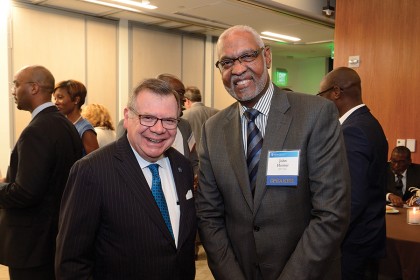- Name
- Patrick Ercolano
- pae@jhu.edu
- Office phone
- 410-234-9296
After success as a pilot program in mid-2018, a new Carey Business School mentorship program for underrepresented minority students is set for a full-scale rollout in spring 2019.
The mentorship program is being developed as part of the school's Leading a Diverse Society initiative. Officially launched in fall 2017 during Carey's Diversity Weekend event, LADS seeks to increase the enrollment and mentorship of underrepresented minorities at Carey. Its strategy involves drawing heavily on the expertise, professional ties, and financial support of alumni of the school's former Leadership Development Program for minority managers.
Bernard Ferrari, dean of the Carey Business School, and John Hunter, a former executive vice president at QVC Inc. and a member of the Dean's Advisory Council, are credited with spurring the creation of LADS and the mentorship program. Hunter was a steadfast backer of the former Leadership Development Program during its 1991-2013 run and has been a generous supporter of student financial aid. James Calvin, a professor who directed the LDP for most of its existence, also contributed to the planning for LADS as a new way to help underrepresented minority students.
"Underrepresented minorities have to have a place at the table, not only to be part of the changes that will advance our society but to lead them," Hunter said last year at the launch of the LADS initiative.
Thirteen matchings of mentors and student mentees were made for the pilot program. In November 2018, Carey began recruiting mentors for the 2019 edition. It is scheduled to run about six months, twice as long as the pilot, to encourage stronger bonds within each matched pair.
Mentors are expected to come primarily from the ranks of Leadership Development Program alumni. Their point of contact at Carey is Roger Williams, senior associate director for diversity and inclusion in the admissions office.
Next month, underrepresented minority students will be recruited as mentees. The goal is to establish about 20 mentor-mentee pairs. Carey's part-time Flexible MBA program is expected to provide the majority of the mentees, who will hail from Carey's Baltimore- and Washington, D.C.-based campuses, as well as from online-only programs.

Image caption: Carey Dean Bernie Ferrari (left) worked with Dean’s Advisory Council member John Hunter to launch the Leading a Diverse Society Initiative.
Image credit: Will Kirk / Johns Hopkins University
Geography is no longer a deterrent to mentorship, especially for online students. Most of the contact between mentors and students will be via phone conversation, email, texting, FaceTime, and Skype, with occasional in-person meetings when possible, says Mary Somers, the Carey contact for the student mentees. Whatever the medium, one monthly communication per pair will probably be typical.
Somers, the associate director of coaching and education in the school's Career Development Office, says she has high hopes for the mentorship program.
"Our mentors have been so successful in their own careers, and they give a lot of credit to the training they got here at Carey. So this is a way for them to give back," she says. "It's an opportunity for the mentors to share experiences and information that the students may not be able to get elsewhere at the school."
Shereece Benson, a licensed certified social worker at Holy Cross Health just outside of Washington, took part in the pilot mentorship program shortly before graduating last summer with an MBA.
Her mentor, Chigozie Okorie—a senior network administrator at the Annie E. Casey Foundation in Baltimore and an alum of both Leadership Diversity Program and the Carey MBA program—"was always available to speak with me on career and life," says Benson. "We spoke in-depth about conquering fear, the power of the ask, and reframing negative stories we always tell ourselves."
The 2019 cycle of the LADS mentorship program will officially begin with a Harbor East reception on April 5, during the annual slate of Alumni Weekend events.








